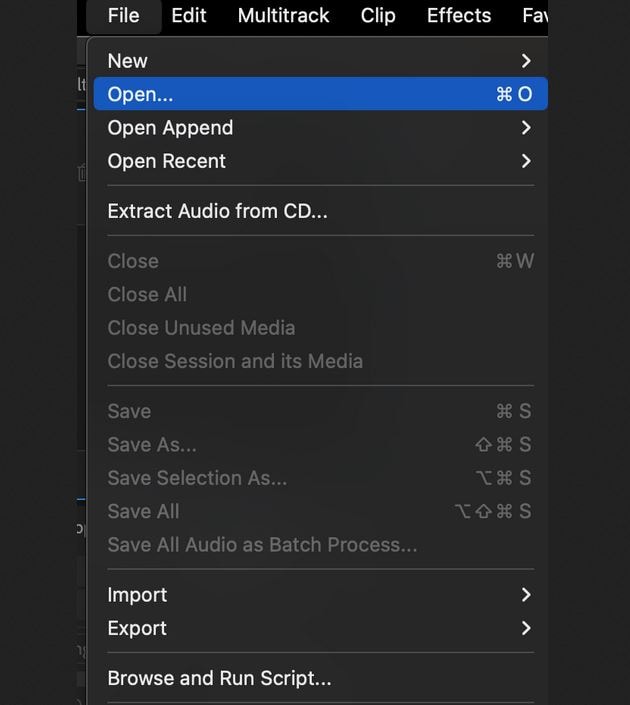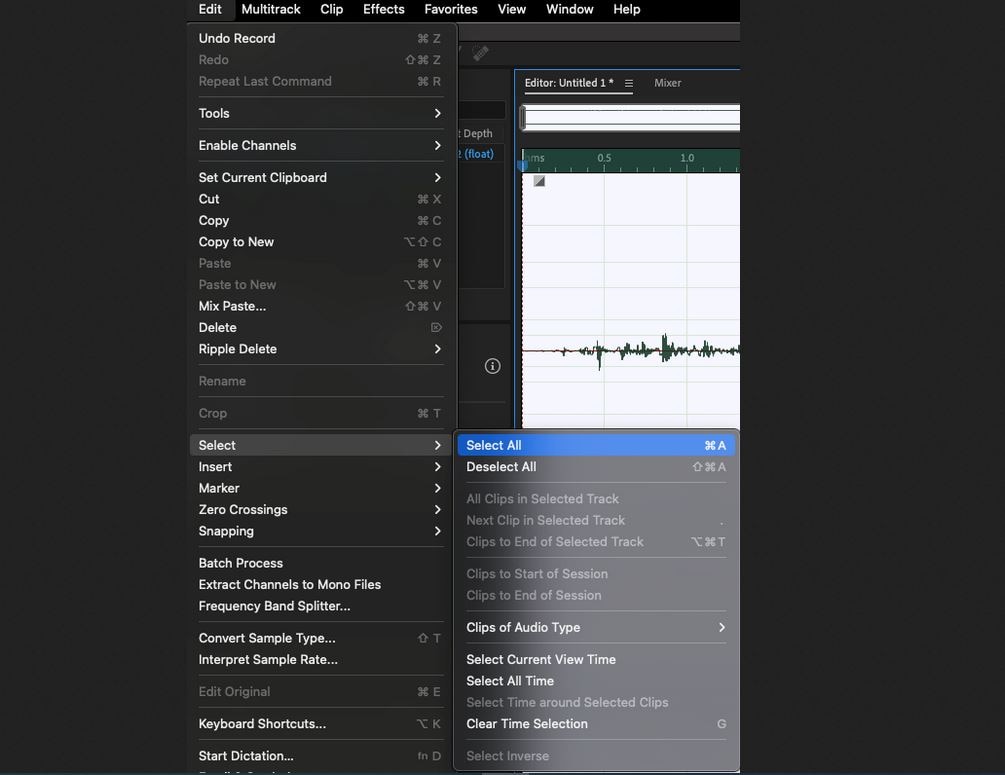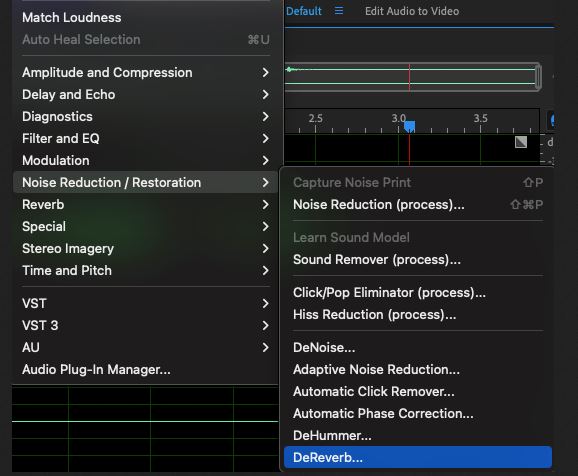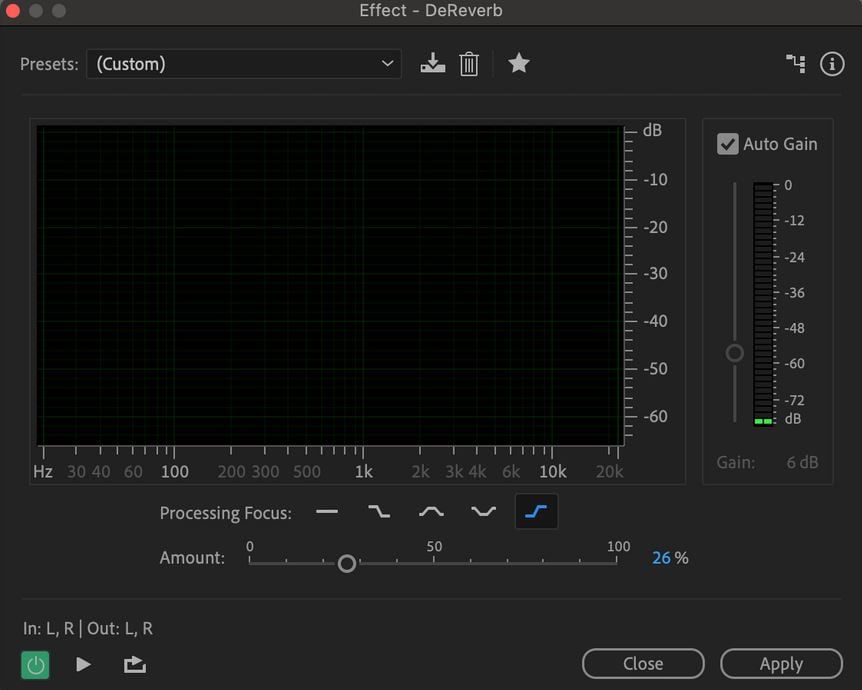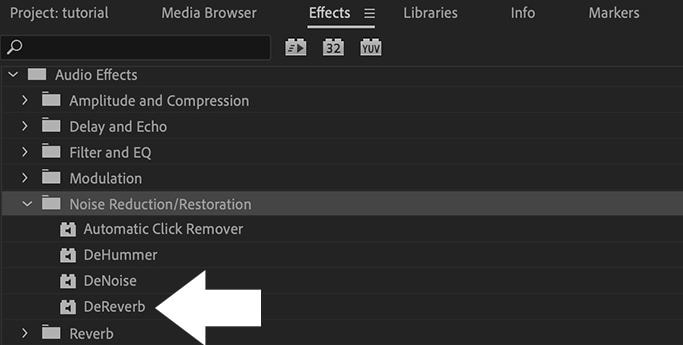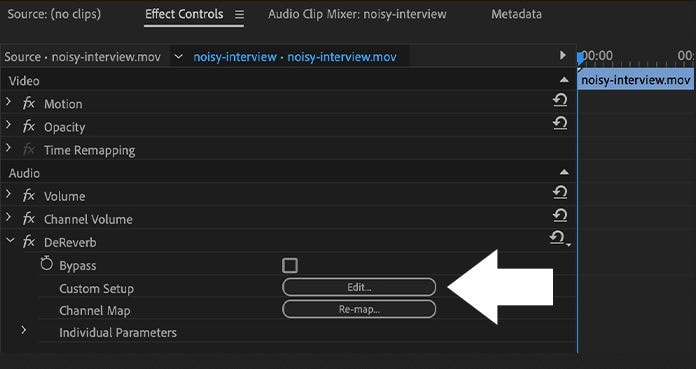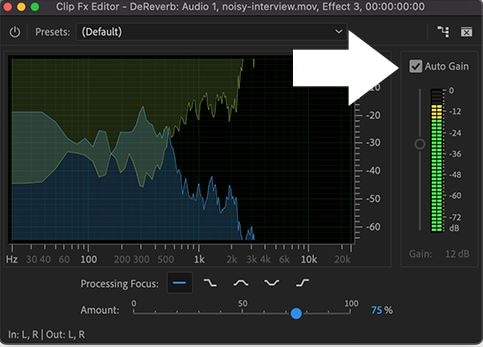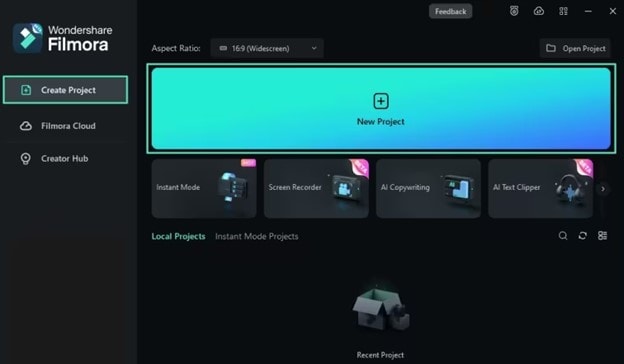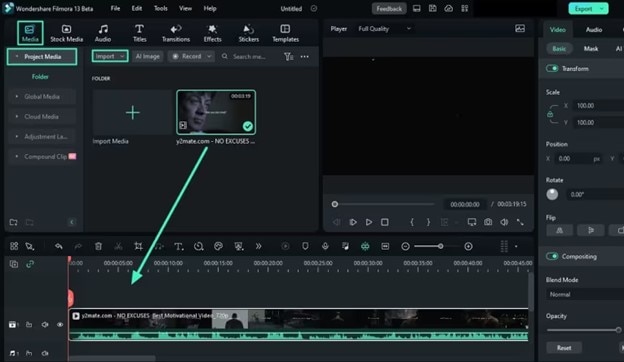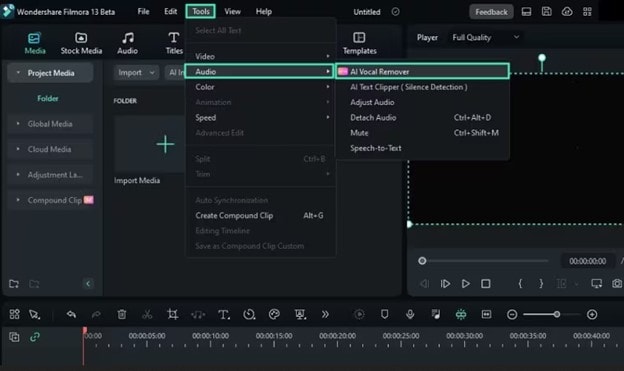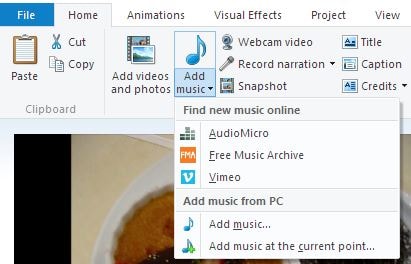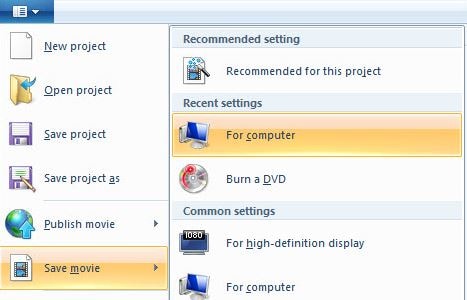
In 2024, Overcoming the Challenge of Acoustic Reflections in Sound Engineering

Overcoming the Challenge of Acoustic Reflections in Sound Engineering
You just finished recording your content and everything seems fine. But when you start editing, you notice echo in your audio with reverberations. This can be so annoying and you will have to publish your content before you remove echo from audio. There are several ways to do this. Some prefer audition echo removal while others are familiar with audacity remove echo tactics. You may also remove echo in Premiere Pro and achieve quality results. This will remove the echo sound in your audio and help achieve better sound clarity. In this article, we explore how you can remove echo from audio using these three main methods and achieve the best results.
AI Vocal Remover A cross-platform for facilitating your video editing process by offering valuable benefits!
Free Download Free Download Learn More
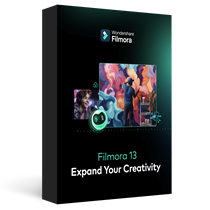
Part 1. How to Remove Echo from Audio in Audacity : A Step-by-Step Guide
Echo in your audio can occur for many reasons. You could be recording a podcast in different locations and working from a home studio. This could naturally create echoes in your audio when microphones pick undesired background noise. When you realize such noises post-production, Audacity may be your solution. Audacity reduces echo and other background sounds with high accuracy. Here are the steps you will need to follow:
Step 1: Start Audacity and Import Audio Files
Visit the Audacity website and download the software if you haven’t already. Do the simple installation process and open the Audacity software on your desktop. Import the audio files that you want to edit by going to File, and then opening or dragging and dropping the files into Audacity.
Step 2: Select Sound Track
Select the track you need to edit by clicking Select on the left side menu. Then choose the file that you want or press CMD+A on Mac or CTRL+A on Windows.
Step 3: Get a Noise Profile
Under the Effect dropdown menu, click Noise Reduction then select Get Noise Profile. This will prepare the track for noise reduction. The window will close immediately after this. Repeat the steps by clicking the Effects Menu, then Noise Reduction, and OK.
Step 4: Replay and Amplify Audio
The waveform of the audio track will change. Replay it to hear the results. Press CMD+Z or CTRL+Z on your to undo the process if not satisfied. Then, repeat the previous steps and play around with different values to achieve a better outcome. When you like the results, the audio volume output will be lower. Click Effects then Amplify to bring the volume back again, and adjust it to the level that you want.
Part 2. How to Remove Echo from Audio in Adobe Audition : A Quick Tutorial
Adobe Audition is an effective editing software that will clean up echoes, winds, reverberations, instruments, and anything in between. The software offers a perfect solution to achieve pleasant audio within minutes.
Step 1: Launch Adobe Audition and Import Files
Start by launching the Audition software on your PC. Then, import the files you want to edit by going to File. Click Menu and select Open to browse the files on your computer.
Step 2: Select Audio File to Edit
You need to select the audio files that you will be removing echo from. Go to the Edit menu, Click Select, and choose Select All. You can also double-click the track.
Step 3: Start the Noise Restoration Menu
Click the Effects Menu, and then the Noise Reduction Restoration. Choose the DeReverb option. This will open the DeReverb window where you can make appropriate adjustments. You also have the option to left-click at the start of the selection. Then drag the dereverb over the part of the track you want to apply it to.
Step 4: Adjust the Amount of DeReverb Effect
Use the slider at the bottom of the DeReverb window to make the adjustments. Drag the slider slowly as you listen to the audio sounds. Be careful not to drag it too far that you start hearing buzzing and clipping. Once satisfied, preview the audio then click Apply and the audio file will be ready.
Part 3. How to Remove Echo from Audio in Premiere Pro : A Quick Guide
The other effective way to remove echoes and reverberation in your audio file is using Premiere Pro. To remove Echo Premiere Pro, you need to add your audio click with Echo and process it with the software. Here is a summary of the steps to follow:
Step 1: Start DeReverb Effect
Start by importing the files that you want to edit to Adobe Premiere Pro. Then drag it into the timeline. On the search box, type DeReverb. You can also click on Audio Effects, followed by Noise Reduction/Restoration, and then DeReverb. Click on the effect and drag it to your clip on the timeline.
Step 2: Setup Your Settings
You should see the new effects under the Effects Control panel. Click the little arrow to the left, followed by Edit to open a new window.
Step 3: Adjust Settings
The new window will display the Clip FX Editor. You will have the option for presents on the top where you can find a default, light, and heavy reverb reduction. Choose one of them and preview it. Adjust the amount of reverb using the slider on the bottom. You can also check the Auto Gain to automatically take care of the volume as you edit the settings. Preview the settings and close the window once satisfied.
Bonus Part. How to Remove Echo from Audio in Wondershare Filmora : A Guided Tutorial
In most cases, you will want to remove echo from audio files to continue editing them further. Probably it is a voiceover for your next YouTube video or even a podcast upload. Wondershare Filmora allows you to do this and more. The versatile video editing software come with some unique features that make audio and video editing a breeze. You even get an AI Copilot that serves as your personal assistant when editing your files.
Free Download For Win 7 or later(64-bit)
Free Download For macOS 10.14 or later
AI Vocal Remover
For you to remove echo from your audio files with Filmora, you will need to utilize the AI Vocal Remover feature. The feature is specially designed to separate vocals and music from any song. However, it also allows you to remove other audio elements from your soundtrack, including echoes and wind. You only need to optimize your preferences, and the feature will handle the rest. Here are the few simple steps you will need to follow:
Step 1: Launch Filmora and Create a New Project
First of all, start the Filmora software on your desktop. Then click the “New Project” tab. This will open the Filmora editing space.
Step 2: Import Your Soundtrack or Files
Select the “Media” tab in the toolbar. This will allow you to edit the soundtrack files you want to edit in this project. Click on the “Files” icon and select the files to import. You can also drag and drop the files from your Windows Explorer or Mac’s Finder onto the Filmora media section.
Step 3: Start AI Vocal Remover
Choose the clips you want to remove echoes from in the timeline. Then click on the “Audio” and select “AI Vocal Remover.” Adjust the settings for DeReverb and Wind removal to remove echoes from your audio file. You can also explore Hum removal, AI Speech Enhancement, and Denoise to achieve optimal results.
Conclusion
Echoes in your soundtracks can be so annoying. They affect the clarity of vocals and can make your audio or video seem unprofessional. While there are many ways you can remove echo from audio, we recommend Wondershare Filmora. The versatile video editor comes with a broad choice of features to help you edit your audio more accurately. You can remove echoes, wind, and more while maintaining the same quality of your audio. The software also allows you to continue editing your audio or video further as desired.
Free Download Free Download Learn More

Part 1. How to Remove Echo from Audio in Audacity : A Step-by-Step Guide
Echo in your audio can occur for many reasons. You could be recording a podcast in different locations and working from a home studio. This could naturally create echoes in your audio when microphones pick undesired background noise. When you realize such noises post-production, Audacity may be your solution. Audacity reduces echo and other background sounds with high accuracy. Here are the steps you will need to follow:
Step 1: Start Audacity and Import Audio Files
Visit the Audacity website and download the software if you haven’t already. Do the simple installation process and open the Audacity software on your desktop. Import the audio files that you want to edit by going to File, and then opening or dragging and dropping the files into Audacity.
Step 2: Select Sound Track
Select the track you need to edit by clicking Select on the left side menu. Then choose the file that you want or press CMD+A on Mac or CTRL+A on Windows.
Step 3: Get a Noise Profile
Under the Effect dropdown menu, click Noise Reduction then select Get Noise Profile. This will prepare the track for noise reduction. The window will close immediately after this. Repeat the steps by clicking the Effects Menu, then Noise Reduction, and OK.
Step 4: Replay and Amplify Audio
The waveform of the audio track will change. Replay it to hear the results. Press CMD+Z or CTRL+Z on your to undo the process if not satisfied. Then, repeat the previous steps and play around with different values to achieve a better outcome. When you like the results, the audio volume output will be lower. Click Effects then Amplify to bring the volume back again, and adjust it to the level that you want.
Part 2. How to Remove Echo from Audio in Adobe Audition : A Quick Tutorial
Adobe Audition is an effective editing software that will clean up echoes, winds, reverberations, instruments, and anything in between. The software offers a perfect solution to achieve pleasant audio within minutes.
Step 1: Launch Adobe Audition and Import Files
Start by launching the Audition software on your PC. Then, import the files you want to edit by going to File. Click Menu and select Open to browse the files on your computer.
Step 2: Select Audio File to Edit
You need to select the audio files that you will be removing echo from. Go to the Edit menu, Click Select, and choose Select All. You can also double-click the track.
Step 3: Start the Noise Restoration Menu
Click the Effects Menu, and then the Noise Reduction Restoration. Choose the DeReverb option. This will open the DeReverb window where you can make appropriate adjustments. You also have the option to left-click at the start of the selection. Then drag the dereverb over the part of the track you want to apply it to.
Step 4: Adjust the Amount of DeReverb Effect
Use the slider at the bottom of the DeReverb window to make the adjustments. Drag the slider slowly as you listen to the audio sounds. Be careful not to drag it too far that you start hearing buzzing and clipping. Once satisfied, preview the audio then click Apply and the audio file will be ready.
Part 3. How to Remove Echo from Audio in Premiere Pro : A Quick Guide
The other effective way to remove echoes and reverberation in your audio file is using Premiere Pro. To remove Echo Premiere Pro, you need to add your audio click with Echo and process it with the software. Here is a summary of the steps to follow:
Step 1: Start DeReverb Effect
Start by importing the files that you want to edit to Adobe Premiere Pro. Then drag it into the timeline. On the search box, type DeReverb. You can also click on Audio Effects, followed by Noise Reduction/Restoration, and then DeReverb. Click on the effect and drag it to your clip on the timeline.
Step 2: Setup Your Settings
You should see the new effects under the Effects Control panel. Click the little arrow to the left, followed by Edit to open a new window.
Step 3: Adjust Settings
The new window will display the Clip FX Editor. You will have the option for presents on the top where you can find a default, light, and heavy reverb reduction. Choose one of them and preview it. Adjust the amount of reverb using the slider on the bottom. You can also check the Auto Gain to automatically take care of the volume as you edit the settings. Preview the settings and close the window once satisfied.
Bonus Part. How to Remove Echo from Audio in Wondershare Filmora : A Guided Tutorial
In most cases, you will want to remove echo from audio files to continue editing them further. Probably it is a voiceover for your next YouTube video or even a podcast upload. Wondershare Filmora allows you to do this and more. The versatile video editing software come with some unique features that make audio and video editing a breeze. You even get an AI Copilot that serves as your personal assistant when editing your files.
Free Download For Win 7 or later(64-bit)
Free Download For macOS 10.14 or later
AI Vocal Remover
For you to remove echo from your audio files with Filmora, you will need to utilize the AI Vocal Remover feature. The feature is specially designed to separate vocals and music from any song. However, it also allows you to remove other audio elements from your soundtrack, including echoes and wind. You only need to optimize your preferences, and the feature will handle the rest. Here are the few simple steps you will need to follow:
Step 1: Launch Filmora and Create a New Project
First of all, start the Filmora software on your desktop. Then click the “New Project” tab. This will open the Filmora editing space.
Step 2: Import Your Soundtrack or Files
Select the “Media” tab in the toolbar. This will allow you to edit the soundtrack files you want to edit in this project. Click on the “Files” icon and select the files to import. You can also drag and drop the files from your Windows Explorer or Mac’s Finder onto the Filmora media section.
Step 3: Start AI Vocal Remover
Choose the clips you want to remove echoes from in the timeline. Then click on the “Audio” and select “AI Vocal Remover.” Adjust the settings for DeReverb and Wind removal to remove echoes from your audio file. You can also explore Hum removal, AI Speech Enhancement, and Denoise to achieve optimal results.
Conclusion
Echoes in your soundtracks can be so annoying. They affect the clarity of vocals and can make your audio or video seem unprofessional. While there are many ways you can remove echo from audio, we recommend Wondershare Filmora. The versatile video editor comes with a broad choice of features to help you edit your audio more accurately. You can remove echoes, wind, and more while maintaining the same quality of your audio. The software also allows you to continue editing your audio or video further as desired.
10 Best Montage Songs for Your Montage Video
What’s a montage video, you ask? It’s the short video you need to save the day. Whether it’s in a sports game, a video game, or just your life, montage songs find their way into every aspect of our media. It can showcase your struggle and success as it makes you feel awesome. A montage video is a very powerful way to tell a story, reveal your brand’s personality, and demonstrate the power of your product.
Video montage songs are meant to be fun and entertaining. They’re like a soundtrack to your montage while bringing out the best parts of the scene. Music can improve a video montage by providing emotional context, elevating the atmosphere, and encouraging viewer engagement. There are many montage videos, such as supercuts, sports edits, comedy clips, and more. All these montages have their tone, style, and subject matter. For this reason, you need to select music that fits in with the rest of your video.
There are many songs out there suitable for montages, but not all of them will make a suitable choice. If you want your video to appeal to everyone and bring people more joy, then you might want to consider these Top 10 Best Montage Songs for Your Montage Video!
How A Well-Picked Song Enhances Your Montage Video
If you have ever been to YouTube and searched for montage videos, then you must have noticed that they all have one thing in common. They have a great soundtrack.
The music is what makes the montage video so special. The right song can make your montage video go viral, while the wrong one can make it fail miserably.
Here are some tips to help you pick the right music for your next montage:
1. Choose music that matches the mood of your video
Many people make the mistake of choosing songs that don’t fit their videos at all. For example, if you’re making a movie about love and romance, it doesn’t make sense to use a heavy metal song about death and destruction. If you do, then your viewers will find it hard to connect with your movie because they will be distracted by the mismatch between what they see and what they hear.
2. Pick songs that match the genre of your video
If you’re making a romantic comedy movie, then try picking up some romantic pop songs instead of heavy metal ones or classical ones. This way, your viewers will know right away what type of movie they’re watching and will be able to enjoy themselves more because they know what to expect from it visually and audibly.
3. The length of your montage video
If you have a long montage video (over 1 minute), you may want to use shorter songs (under 3 minutes) to fit seamlessly into each other without any awkward pauses or breaks in sound.
4. Keep in mind that there are two types of songs - instrumental and vocal
Vocal songs have lyrics that can be sung along while listening to them, whereas instrumental ones don’t have any words but only music in them. It depends on what kind of effect you want to create in your audience’s minds when they listen to it. For example, if you want people to feel happy about something or if it’s about a celebration, then an instrumental one will work better than a vocal one because most people don’t like singing along with instrumental songs since they don’t know what the actual lyrics are.
5. Think about the emotions you want to convey
The most important thing when choosing a song is that it matches the emotion of your montage video. For example, if you want to express joyfulness, then you should choose a happy song with a rhythm that can bring up people’s spirits; if you want to express sadness, then you should choose a sad song with an emotional melody; if you want to express anger or hatred, then use heavy metal music; if you want to express love, then use romantic music; etc.
These are some tips to consider when adding music to your montage videos. Music is an important part of a video montage. It’s the second most important part after the video itself. A good song can make your montage more enjoyable and memorable. The wrong one can ruin it completely.
Top 10 Best Montage Songs
We have compiled a list of the top 10 montage songs you can use in your videos.
1. CJ - Whoopty (Robert Cristian Remix)
American rapper CJ released his debut single, “Whoopty.” The track was originally self-released on July 30, 2020. Warner Records later re-released it after he signed with the label. It is one of the most popular montage songs.
- Genre: Drill
- Copyright: Free
CJ - Whoopty
2. Trevor Daniel - Falling
On October 5, 2018, Alamo Records, Internet Money Records, and Interscope Records released Trevor Daniel’s song “Falling” from his debut EP Homesick (2018) and debut studio album Nicotine (2020). In July 2018, Daniel signed to Internet Money, a record label whose label, Alamo, previously signed him to Alamo and Interscope. He wrote the song within “a matter of hours” during his first studio session with Taylor. “The energy wasn’t the same” when Daniel recalls an attempt to add a second verse to the song. It was eventually released as an official song.
- Genre: Pop
- Copyright: Free
CJ - Whoopty
3. Thotties - Pear Lindsay
Thotties is a song by Pear Lindsay. The album is also named Thotties, and the song was released in 2020. The length of the song is 2 minutes and 33 seconds. The song is a popular montage song, and you may already see hundreds of montages with this song in the background.
- Genre: Hip-Hop/Rap
- Copyright: Free
Thotties
4. Gang Gang - Badda
Gang is a popular montage song from Badda TD. This song has a different vibe, and hundreds of people use this song when they create montage videos. The gamers especially prefer it because the beats of the song sync very well with the shooting gameplay videos.
- Genre: Hip-Hop/Rap
- Copyright: Free
Gang Gang
5. NEFFEX - Cold
An independent production duo comprised of vocalist Brandon “B-Ho” Horth and DJ Cam Wales is called NEFFEX. Their work combines hip hop, alternative rock, and dance music. They share experiences and encourage people to chase after their dreams through their lyrics. Their song Cold is one of the most popular montage songs out there.
- Genre: Hip-Hop/Rap
- Copyright: Free
Gang Gang
6. Scam 1992 Theme
Scam 1992 theme song is one of the most popular and favorite songs for montage videos. There is a fair chance that you may have already heard this song in the background of any video, but now you know its name. It is the theme song of a TV series released in 2020.
- Genre: Indian Hip-Hop/Rap
- Copyright: Free
Scam 1992 Theme
7. Cradles x Apsara Aali Remix
It is the remix of two songs of different genres. The remix sounds very pleasant to the ears, and it is no doubt one of the best montage songs for videos. It is especially preferred for gaming montages.
- Genre: Indian Hip-Hop/Rap/ Remix
- Copyright: Free
Cradles x Apsara Aali Remix
8. TonyZ - Road So Far
The song is actually inspired by Alan Walker’s Alone and long road song and sounds a bit similar. The beats are slightly different, and it is a non-lyrical song, making it a perfect choice for montage songs.
- Genre: Dance/Electronic
- Copyright: Free
TonyZ - Road So Far
9. Bazanji - Fed Up
Fed Up is a hip-hop song by Bazanji. The flow of this song is very smooth, and the background music is pretty amusing. There are some qualities in this song that make it a perfect choice for montage videos.
- Genre: Hip-Hop/Rap
- Copyright: Free
Bazanji - Fed Up
10. DJ Gimi-O x Habibi(Albanian Remix)
‘Habibi’ by Dutch artist Ricky Rich has been remixed in north Albanian/Balkan folk style.’ Habibi’ by Dutch artist Ricky Rich has been remixed in north Albanian/Balkan folk style. Many montage creators prefer this song because the beat sync of this song is perfect for montage videos. You may have already seen plenty of montage videos with this song in the background.
- Genre: Dance/Electronic
- Copyright: Free
Bazanji - Fed Up
Wondershare Filmora11 Express Better
Achieve More
Grow Together
Free Download Free Download Learn More

Summarize:
That does it for this list, but I’m sure you could think of many other great montage songs to replace these. These songs were the top 10 most requested by fans, so here’s hoping one of them was on your wanted list. And if none are quite your style or taste, maybe you’ll see something in someone else’s top ten, that is, or even better, maybe you will discover a new song that is just perfect for adding to your montage video. Enjoy listening!
CJ - Whoopty
2. Trevor Daniel - Falling
On October 5, 2018, Alamo Records, Internet Money Records, and Interscope Records released Trevor Daniel’s song “Falling” from his debut EP Homesick (2018) and debut studio album Nicotine (2020). In July 2018, Daniel signed to Internet Money, a record label whose label, Alamo, previously signed him to Alamo and Interscope. He wrote the song within “a matter of hours” during his first studio session with Taylor. “The energy wasn’t the same” when Daniel recalls an attempt to add a second verse to the song. It was eventually released as an official song.
- Genre: Pop
- Copyright: Free
CJ - Whoopty
3. Thotties - Pear Lindsay
Thotties is a song by Pear Lindsay. The album is also named Thotties, and the song was released in 2020. The length of the song is 2 minutes and 33 seconds. The song is a popular montage song, and you may already see hundreds of montages with this song in the background.
- Genre: Hip-Hop/Rap
- Copyright: Free
Thotties
4. Gang Gang - Badda
Gang is a popular montage song from Badda TD. This song has a different vibe, and hundreds of people use this song when they create montage videos. The gamers especially prefer it because the beats of the song sync very well with the shooting gameplay videos.
- Genre: Hip-Hop/Rap
- Copyright: Free
Gang Gang
5. NEFFEX - Cold
An independent production duo comprised of vocalist Brandon “B-Ho” Horth and DJ Cam Wales is called NEFFEX. Their work combines hip hop, alternative rock, and dance music. They share experiences and encourage people to chase after their dreams through their lyrics. Their song Cold is one of the most popular montage songs out there.
- Genre: Hip-Hop/Rap
- Copyright: Free
Gang Gang
6. Scam 1992 Theme
Scam 1992 theme song is one of the most popular and favorite songs for montage videos. There is a fair chance that you may have already heard this song in the background of any video, but now you know its name. It is the theme song of a TV series released in 2020.
- Genre: Indian Hip-Hop/Rap
- Copyright: Free
Scam 1992 Theme
7. Cradles x Apsara Aali Remix
It is the remix of two songs of different genres. The remix sounds very pleasant to the ears, and it is no doubt one of the best montage songs for videos. It is especially preferred for gaming montages.
- Genre: Indian Hip-Hop/Rap/ Remix
- Copyright: Free
Cradles x Apsara Aali Remix
8. TonyZ - Road So Far
The song is actually inspired by Alan Walker’s Alone and long road song and sounds a bit similar. The beats are slightly different, and it is a non-lyrical song, making it a perfect choice for montage songs.
- Genre: Dance/Electronic
- Copyright: Free
TonyZ - Road So Far
9. Bazanji - Fed Up
Fed Up is a hip-hop song by Bazanji. The flow of this song is very smooth, and the background music is pretty amusing. There are some qualities in this song that make it a perfect choice for montage videos.
- Genre: Hip-Hop/Rap
- Copyright: Free
Bazanji - Fed Up
10. DJ Gimi-O x Habibi(Albanian Remix)
‘Habibi’ by Dutch artist Ricky Rich has been remixed in north Albanian/Balkan folk style.’ Habibi’ by Dutch artist Ricky Rich has been remixed in north Albanian/Balkan folk style. Many montage creators prefer this song because the beat sync of this song is perfect for montage videos. You may have already seen plenty of montage videos with this song in the background.
- Genre: Dance/Electronic
- Copyright: Free
Bazanji - Fed Up
Wondershare Filmora11 Express Better
Achieve More
Grow Together
Free Download Free Download Learn More

Summarize:
That does it for this list, but I’m sure you could think of many other great montage songs to replace these. These songs were the top 10 most requested by fans, so here’s hoping one of them was on your wanted list. And if none are quite your style or taste, maybe you’ll see something in someone else’s top ten, that is, or even better, maybe you will discover a new song that is just perfect for adding to your montage video. Enjoy listening!
The Art of Auditory Transformation: Replacing Audio in Videos Step by Step
Video editing is inclusive of editing the audio track. You may be working on background scores, original soundtracks, and different kinds of sound effects. These tasks would need you to edit or replace audio in the video. You may have to mix other audio tracks to have one score. From sound engineering to finely editing every track being mixed, it is an ever expanding and exciting technical niche that will depend largely on a plethora of tools, so in this article, we will let you how to replace audio in video with 2 methods by using Filmora and Windows Movie Maker.
In this article
01 How to replace audio in video with Filmora
02 How to change audio in video with Windows Movie Maker
Part 1: How to replace audio in video with Filmora
The first method, let us explore how you can replace audio in video with Wondershare Filmora.
To begin with, get a free trial copy of Wondershare Filmora .
For Win 7 or later (64-bit)
For macOS 10.12 or later
Step 1. Import file
Open the application and click ‘ Import once you have downloaded and installed Wondershare Filmora. Please search for the relevant video you wish to edit and load it from the hard disk or the specific folder. You can select multiple videos using ‘ctrl’ and clicking on the chosen files.
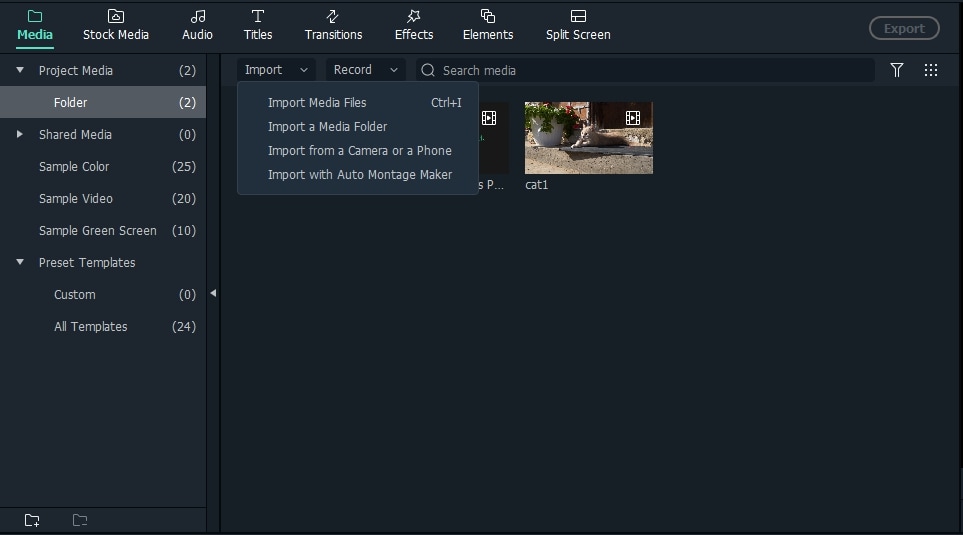
Step 2. Drag and drop to the video Timeline
The videos selected will be displayed as thumbnails. Choose a video, hit and click without releasing the click and drag the chosen video to the Video Timeline.
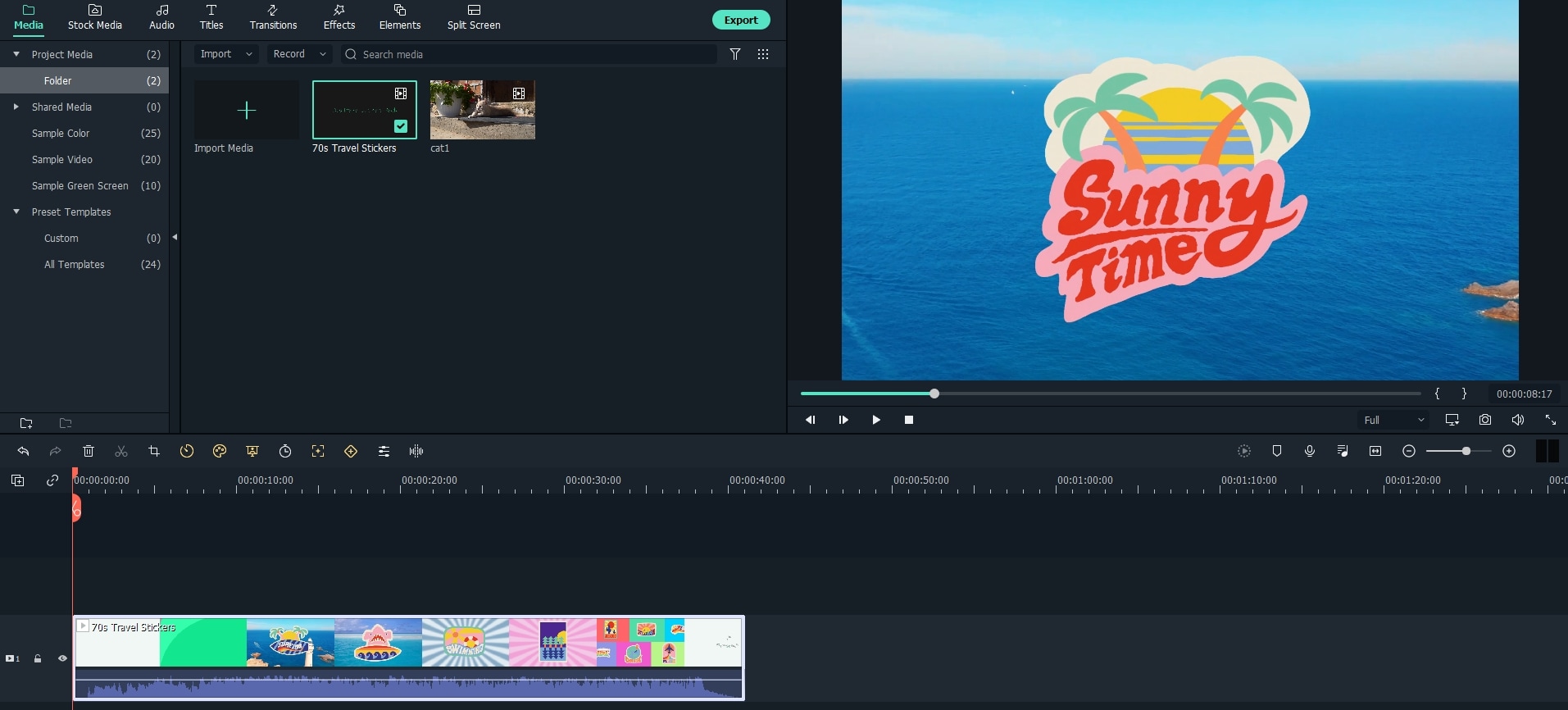
Step 3. Remove the original sound of the video
Right-click on it, and you would see the option of “Audio detach.” Click on it, and the audio file will detach from the video file and get added to Music Timeline.
Press “Delete” on your keyboard, and you will get rid of it. You can save this video without the audio, and you would only have the visuals, unimpaired and unaffected in any way, without the sound.
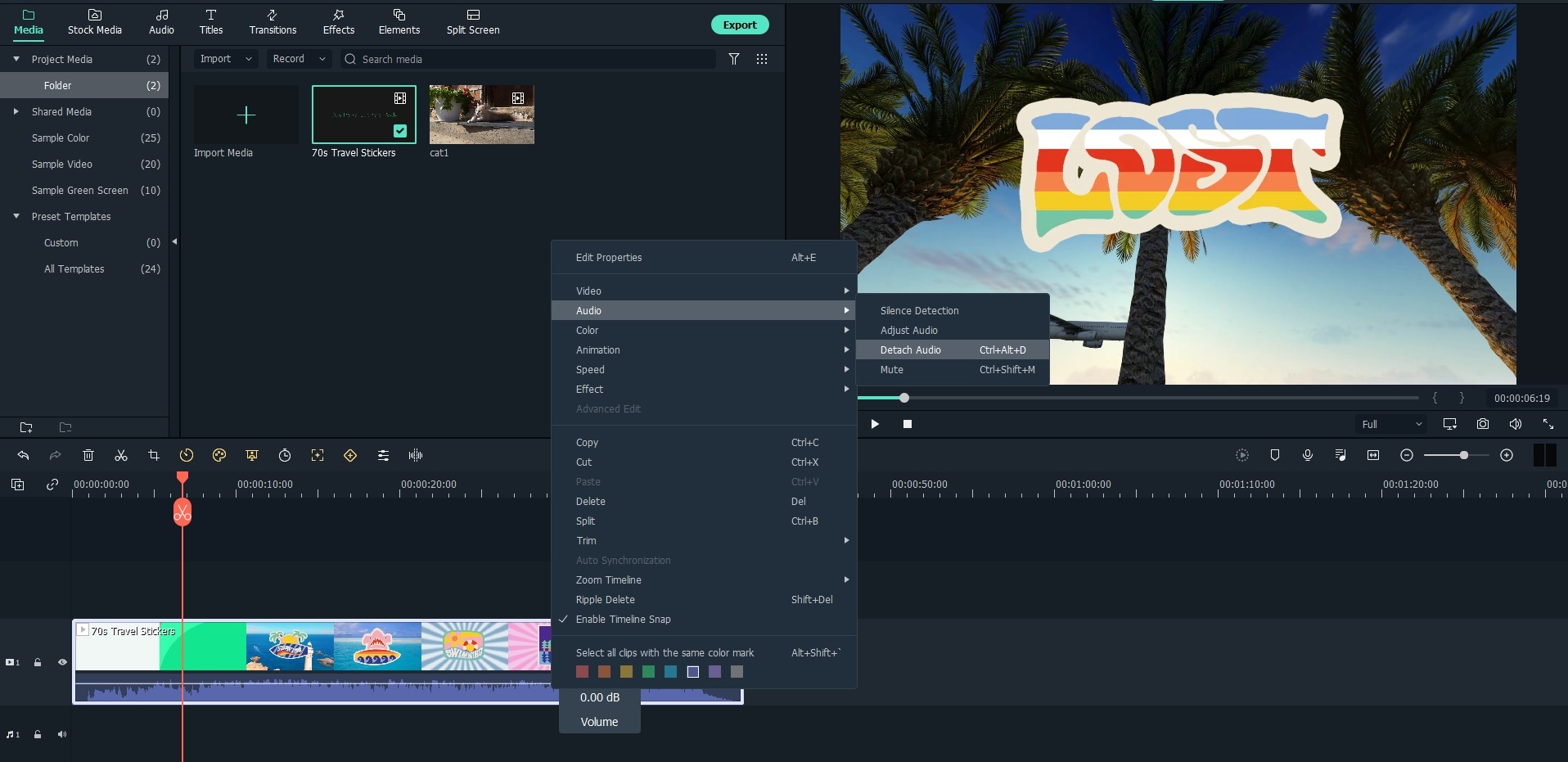
Step 4. Add a new audio track
You can add a new audio track to the video by choosing royalty sound or music from the Filmora library or importing any audio you like.
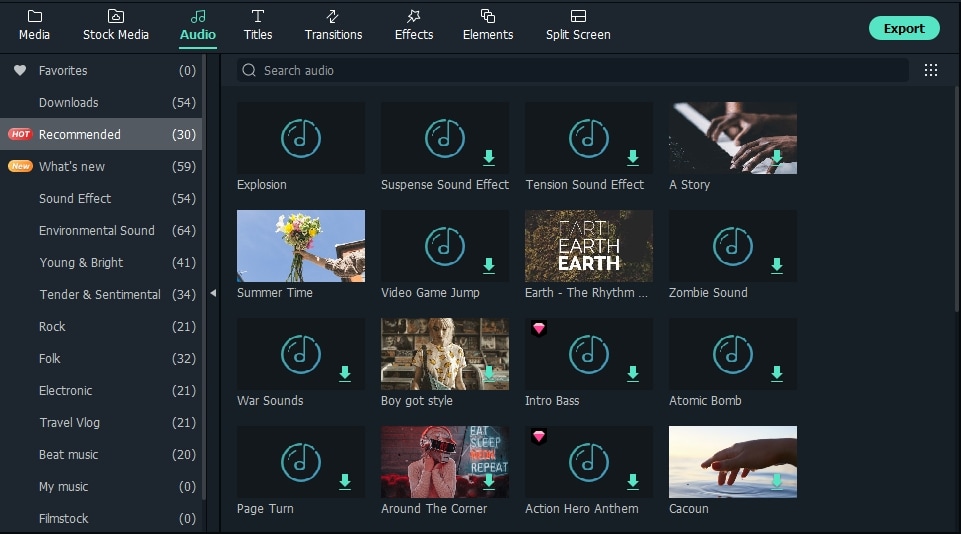
Part 2: How to change audio in video with Windows Movie Maker
The second method, Apart from replacing audio by Filmora, you can also make it by Windows Movie Maker. Though it is discontinued to develop a new version, you can still use it in Windows 7. Below are the steps to replace audio in Windows Movie Maker .
Step 1: Import video
First, download and run it. Click Add videos and photos to import video.
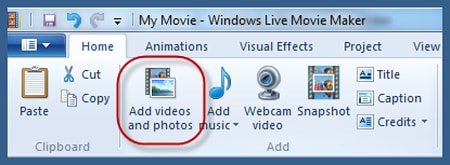
Step 2: Turn off the original sound
Click Edit tab > Video volume to turn off the sound by draging the slider to the left.
Step 3: Add audio to video
Click Add music to import the targeted music to Windows Movie Maker. You can select Add music or Add music at the current point.
Step 4: Save project
Click the file icon in the top left corner to save the video. Choose Save movie to export the targeted file.
Wondershare Filmora allows you to replace easily and edit the audio in the video
Unfortunately, no application by default on your desktop or laptop, phone, or tablet would get this done. To replace audio in the video, you would need the help of state of the art software. Fortunately, you have Wondershare Filmora at your disposal.
With Wondershare Filmora, you can replace audio in the video, mute audio, detach the audio, and add audio. You can eliminate background noise, organic noise, sound effects, address the sync problem in a video file, and edit the audio in a video without any extensive training or expertise.
- It has a user-friendly interface which makes things simple even for amateurs.
- It supports all common video and audio formats, including WMV, MOV, FLV, MTS, MP4, etc.
- You can move audio, replace it or add new audio to the video without worrying about general loss, which is loss of quality.
- You can export the edited video with the new or edited audio to various devices, including the cloud and social media sites.
- Compatible with Windows (including Windows 8) & Mac OS X (10.6 and above).
For Win 7 or later (64-bit)
For macOS 10.12 or later
02 How to change audio in video with Windows Movie Maker
Part 1: How to replace audio in video with Filmora
The first method, let us explore how you can replace audio in video with Wondershare Filmora.
To begin with, get a free trial copy of Wondershare Filmora .
For Win 7 or later (64-bit)
For macOS 10.12 or later
Step 1. Import file
Open the application and click ‘ Import once you have downloaded and installed Wondershare Filmora. Please search for the relevant video you wish to edit and load it from the hard disk or the specific folder. You can select multiple videos using ‘ctrl’ and clicking on the chosen files.

Step 2. Drag and drop to the video Timeline
The videos selected will be displayed as thumbnails. Choose a video, hit and click without releasing the click and drag the chosen video to the Video Timeline.

Step 3. Remove the original sound of the video
Right-click on it, and you would see the option of “Audio detach.” Click on it, and the audio file will detach from the video file and get added to Music Timeline.
Press “Delete” on your keyboard, and you will get rid of it. You can save this video without the audio, and you would only have the visuals, unimpaired and unaffected in any way, without the sound.

Step 4. Add a new audio track
You can add a new audio track to the video by choosing royalty sound or music from the Filmora library or importing any audio you like.

Part 2: How to change audio in video with Windows Movie Maker
The second method, Apart from replacing audio by Filmora, you can also make it by Windows Movie Maker. Though it is discontinued to develop a new version, you can still use it in Windows 7. Below are the steps to replace audio in Windows Movie Maker .
Step 1: Import video
First, download and run it. Click Add videos and photos to import video.

Step 2: Turn off the original sound
Click Edit tab > Video volume to turn off the sound by draging the slider to the left.
Step 3: Add audio to video
Click Add music to import the targeted music to Windows Movie Maker. You can select Add music or Add music at the current point.
Step 4: Save project
Click the file icon in the top left corner to save the video. Choose Save movie to export the targeted file.
Wondershare Filmora allows you to replace easily and edit the audio in the video
Unfortunately, no application by default on your desktop or laptop, phone, or tablet would get this done. To replace audio in the video, you would need the help of state of the art software. Fortunately, you have Wondershare Filmora at your disposal.
With Wondershare Filmora, you can replace audio in the video, mute audio, detach the audio, and add audio. You can eliminate background noise, organic noise, sound effects, address the sync problem in a video file, and edit the audio in a video without any extensive training or expertise.
- It has a user-friendly interface which makes things simple even for amateurs.
- It supports all common video and audio formats, including WMV, MOV, FLV, MTS, MP4, etc.
- You can move audio, replace it or add new audio to the video without worrying about general loss, which is loss of quality.
- You can export the edited video with the new or edited audio to various devices, including the cloud and social media sites.
- Compatible with Windows (including Windows 8) & Mac OS X (10.6 and above).
For Win 7 or later (64-bit)
For macOS 10.12 or later
02 How to change audio in video with Windows Movie Maker
Part 1: How to replace audio in video with Filmora
The first method, let us explore how you can replace audio in video with Wondershare Filmora.
To begin with, get a free trial copy of Wondershare Filmora .
For Win 7 or later (64-bit)
For macOS 10.12 or later
Step 1. Import file
Open the application and click ‘ Import once you have downloaded and installed Wondershare Filmora. Please search for the relevant video you wish to edit and load it from the hard disk or the specific folder. You can select multiple videos using ‘ctrl’ and clicking on the chosen files.

Step 2. Drag and drop to the video Timeline
The videos selected will be displayed as thumbnails. Choose a video, hit and click without releasing the click and drag the chosen video to the Video Timeline.

Step 3. Remove the original sound of the video
Right-click on it, and you would see the option of “Audio detach.” Click on it, and the audio file will detach from the video file and get added to Music Timeline.
Press “Delete” on your keyboard, and you will get rid of it. You can save this video without the audio, and you would only have the visuals, unimpaired and unaffected in any way, without the sound.

Step 4. Add a new audio track
You can add a new audio track to the video by choosing royalty sound or music from the Filmora library or importing any audio you like.

Part 2: How to change audio in video with Windows Movie Maker
The second method, Apart from replacing audio by Filmora, you can also make it by Windows Movie Maker. Though it is discontinued to develop a new version, you can still use it in Windows 7. Below are the steps to replace audio in Windows Movie Maker .
Step 1: Import video
First, download and run it. Click Add videos and photos to import video.

Step 2: Turn off the original sound
Click Edit tab > Video volume to turn off the sound by draging the slider to the left.
Step 3: Add audio to video
Click Add music to import the targeted music to Windows Movie Maker. You can select Add music or Add music at the current point.
Step 4: Save project
Click the file icon in the top left corner to save the video. Choose Save movie to export the targeted file.
Wondershare Filmora allows you to replace easily and edit the audio in the video
Unfortunately, no application by default on your desktop or laptop, phone, or tablet would get this done. To replace audio in the video, you would need the help of state of the art software. Fortunately, you have Wondershare Filmora at your disposal.
With Wondershare Filmora, you can replace audio in the video, mute audio, detach the audio, and add audio. You can eliminate background noise, organic noise, sound effects, address the sync problem in a video file, and edit the audio in a video without any extensive training or expertise.
- It has a user-friendly interface which makes things simple even for amateurs.
- It supports all common video and audio formats, including WMV, MOV, FLV, MTS, MP4, etc.
- You can move audio, replace it or add new audio to the video without worrying about general loss, which is loss of quality.
- You can export the edited video with the new or edited audio to various devices, including the cloud and social media sites.
- Compatible with Windows (including Windows 8) & Mac OS X (10.6 and above).
For Win 7 or later (64-bit)
For macOS 10.12 or later
02 How to change audio in video with Windows Movie Maker
Part 1: How to replace audio in video with Filmora
The first method, let us explore how you can replace audio in video with Wondershare Filmora.
To begin with, get a free trial copy of Wondershare Filmora .
For Win 7 or later (64-bit)
For macOS 10.12 or later
Step 1. Import file
Open the application and click ‘ Import once you have downloaded and installed Wondershare Filmora. Please search for the relevant video you wish to edit and load it from the hard disk or the specific folder. You can select multiple videos using ‘ctrl’ and clicking on the chosen files.

Step 2. Drag and drop to the video Timeline
The videos selected will be displayed as thumbnails. Choose a video, hit and click without releasing the click and drag the chosen video to the Video Timeline.

Step 3. Remove the original sound of the video
Right-click on it, and you would see the option of “Audio detach.” Click on it, and the audio file will detach from the video file and get added to Music Timeline.
Press “Delete” on your keyboard, and you will get rid of it. You can save this video without the audio, and you would only have the visuals, unimpaired and unaffected in any way, without the sound.

Step 4. Add a new audio track
You can add a new audio track to the video by choosing royalty sound or music from the Filmora library or importing any audio you like.

Part 2: How to change audio in video with Windows Movie Maker
The second method, Apart from replacing audio by Filmora, you can also make it by Windows Movie Maker. Though it is discontinued to develop a new version, you can still use it in Windows 7. Below are the steps to replace audio in Windows Movie Maker .
Step 1: Import video
First, download and run it. Click Add videos and photos to import video.

Step 2: Turn off the original sound
Click Edit tab > Video volume to turn off the sound by draging the slider to the left.
Step 3: Add audio to video
Click Add music to import the targeted music to Windows Movie Maker. You can select Add music or Add music at the current point.
Step 4: Save project
Click the file icon in the top left corner to save the video. Choose Save movie to export the targeted file.
Wondershare Filmora allows you to replace easily and edit the audio in the video
Unfortunately, no application by default on your desktop or laptop, phone, or tablet would get this done. To replace audio in the video, you would need the help of state of the art software. Fortunately, you have Wondershare Filmora at your disposal.
With Wondershare Filmora, you can replace audio in the video, mute audio, detach the audio, and add audio. You can eliminate background noise, organic noise, sound effects, address the sync problem in a video file, and edit the audio in a video without any extensive training or expertise.
- It has a user-friendly interface which makes things simple even for amateurs.
- It supports all common video and audio formats, including WMV, MOV, FLV, MTS, MP4, etc.
- You can move audio, replace it or add new audio to the video without worrying about general loss, which is loss of quality.
- You can export the edited video with the new or edited audio to various devices, including the cloud and social media sites.
- Compatible with Windows (including Windows 8) & Mac OS X (10.6 and above).
For Win 7 or later (64-bit)
For macOS 10.12 or later
Also read:
- [New] 2024 Approved The Beat Drops Highlighting This Year's Best Music Vids
- [New] Apowersoft Screen Record Unveiled - Top Alternatives Reviewed for 2024
- [New] Elevating Gameplay Tips for Using the Steam Switch Controller for 2024
- [Updated] Guide for Snapchat Business
- 2024 Approved The Ultimate Voice Transformation Handbook for Gamers
- Delving Into the World of Artificial Intelligence with Claude 2
- Glitch Overcome: Visuals Preserved and Stable
- In 2024, The Updated Method to Bypass Nokia C110 FRP
- In 2024, YouTube Streams Optimal WebM Converters Ranked
- New 2024 Approved The Ultimate Guide to Drying Out Distorted Sounds Three Effective Methods
- New In 2024, Comprehensive Review of Wave Editor Capabilities for New Users
- New In 2024, Essential Links for Obtaining High-Quality Ding Sound Samples
- New In 2024, Voice Cloning Simplified Two Approaches to Achieve Consistent AI Voices
- New The Most Suitable Chromebook-Friendly Audio Editing Software for Modern Musicians (Top 8 List, Updated ) for 2024
- Revival Tactics: Restoring Microsoft Store on Win 11 & 11
- Title: In 2024, Overcoming the Challenge of Acoustic Reflections in Sound Engineering
- Author: David
- Created at : 2024-10-08 01:28:27
- Updated at : 2024-10-11 20:49:51
- Link: https://sound-tweaking.techidaily.com/in-2024-overcoming-the-challenge-of-acoustic-reflections-in-sound-engineering/
- License: This work is licensed under CC BY-NC-SA 4.0.




